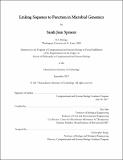Linking sequence to function in microbial genomics
Author(s)
Spencer, Sarah Jean
DownloadFull printable version (7.743Mb)
Other Contributors
Massachusetts Institute of Technology. Computational and Systems Biology Program.
Advisor
Eric Alm.
Terms of use
Metadata
Show full item recordAbstract
Microbial genomes show high plasticity due to horizontal transfer, large community sizes, and rapid growth paired with adaptive mutations. Despite this mutability of gene content, most studies of microbial communities still rely on bulk, single-gene amplicon sequencing. In this thesis, I present methods that interrogate the gene content of single cells derived from complex natural communities. In the first project, I present a novel molecular biology method to link a bacterial functional gene to its host species with single-cell resolution. This high-throughput protocol is applied to assess the distribution of anaerobic respiration genes in a lake ecosystem. In the second project, I demonstrate extensions of this methodology to link genes between spatially proximal microbial cells, and apply this approach to probe the spatial organization of human dental plaque using DNA sequencing. In the final project, I completed whole-genome sequencing of environmental isolates derived from single, cultivable cells and employ mutational and horizontal transfer analysis to demonstrate adaptation to harsh environmental conditions in contaminated groundwater. These projects demonstrate the rich information stored within each microbial genome and the impact of spatial distribution in the environment. Each effort also contributes or highlights new molecular biology techniques to generate genomic data from individual microbial cells.
Description
Thesis: Ph. D., Massachusetts Institute of Technology, Computational and Systems Biology Program, 2017. This electronic version was submitted by the student author. The certified thesis is available in the Institute Archives and Special Collections. Cataloged from student-submitted PDF version of thesis. Includes bibliographical references (pages 129-140).
Date issued
2017Department
Massachusetts Institute of Technology. Computational and Systems Biology ProgramPublisher
Massachusetts Institute of Technology
Keywords
Computational and Systems Biology Program.